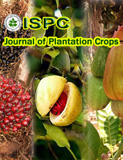Coconut based integrated farming: A climate-smart model for food security and economic prosperity
DOI:
https://doi.org/10.25081/jpc.2021.v49.i2.7256Abstract
A coconut-based integrated farming system (IFS) model suited for lowlands was developed at the Integrated Farming System Research Station (IFSRS), Karamana, Kerala State, India, under Kerala Agricultural University. The area of the model was decided as 0.2 ha, matching the average per capita land availability of a marginal farmer in the State. Apart from the major crop coconut, intercrops, such as vegetables, fruit crops, spices, fodder and tuber crops were included in the model. The allied enterprises integrated were livestock, azolla, and agroforestry. Tree components of the model comprised of teak, jack, breadfruit, garcinia and mango. Research data for five years revealed that the model generated food products above the requirement of a four-member family, and the surplus production could contribute to farmer’s income. The productivity under the IFS model was enhanced ten-folds compared to that under the sole crop of coconut for the same area. Plant nutrients were generated within the farm through organic recycling, which contributed to the substantial saving of chemical fertilizers. The system was found climate-smart because of reduced use of chemical fertilizers and net negative emission of greenhouse gases mostly achieved through agroforestry. This IFS model could also ensure considerable employment generation. The model could be adopted by farmers of lowland tracts of Kerala having similar agro-climatic features for better economic returns and environmental benefits.
Downloads
Published
How to Cite
Issue
Section
Copyright (c) 2021 Journal of Plantation Crops

This work is licensed under a Creative Commons Attribution 4.0 International License.







 .
.